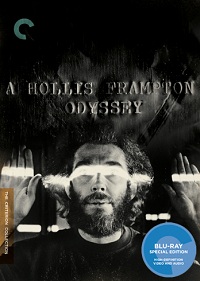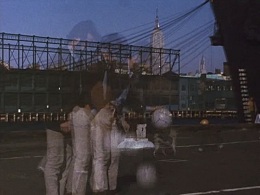Experimental films function on a wholly different level than narrative films. Where most movies, fictional or documentaries, are focused on telling straightforward stories, experimental films aren’t necessarily concerned with that.
 Many experimental films are self-reflexive, and force the viewer to consider the medium as much as the message. In the case of the 24 Hollis Frampton experimental movies from 1966 to 1979 included on the new Criterion Blu-ray A Hollis Frampton Odyssey, this is very much true. In fact, all the films in this retrospective set will bring to mind questions about how they were created. Pondering those questions—and the set of filmic limitations and possibilities—are the reason the films exist in the first place.
Many experimental films are self-reflexive, and force the viewer to consider the medium as much as the message. In the case of the 24 Hollis Frampton experimental movies from 1966 to 1979 included on the new Criterion Blu-ray A Hollis Frampton Odyssey, this is very much true. In fact, all the films in this retrospective set will bring to mind questions about how they were created. Pondering those questions—and the set of filmic limitations and possibilities—are the reason the films exist in the first place.
Hollis Frampton made close to 100 films and photographic series before his death at forty-eight from cancer. His avant-garde work would come to be considered “structural” by writer P. Adams Sitney, “in which the shape of the whole film is predetermined and simplified, and it is that shape that is the primal impression of the film.”
To view the films in A Hollis Frampton Odyssey, one must shut out outside influences and concentrate on the films themselves. For Frampton’s films to engage the mind, you must first be seduced by them. Almost all the works on this disc are minimal in nature and they begin asking questions the moment they appear on the screen.
 Often times the films appear to be formalist puzzles, such as Zorns Lemma, an hour-long film divided into three parts that was the first feature-length experimental film shown at the New York Film Festival. A lengthy section in the middle is devoted to one-second handheld shots of New York City in the late 60s.
Often times the films appear to be formalist puzzles, such as Zorns Lemma, an hour-long film divided into three parts that was the first feature-length experimental film shown at the New York Film Festival. A lengthy section in the middle is devoted to one-second handheld shots of New York City in the late 60s.
The rhythmic repetition of these shots is equal parts maddening and hypnotic. The viewer will figure out a pattern pretty quickly and come to count on the film to deliver that pattern—each shot contains a letter of the alphabet and arrives in a set of 24, representing the Roman alphabet.
This middle section of the film is silent, but it certainly isn’t wordless. The ever-reliable one-second cuts kind of become their own throbbing soundtrack as your mind fills in the blanks. Frampton is also filling in the blanks, replacing a different letter in the series each time out with an image without direct alphabetical correlation. There are more than a hundred cycles, which gives the viewer more than enough time to let their mind wander wherever it may take them or allow them to focus in on one minute detail of the pattern.
![[nostalgia]-frampton [nostalgia]-hollis-frampton-experimental](https://www.scene-stealers.com/wp-content/uploads//2012/05/nostalgia-frampton.jpg) The last section of the film is a break for the eyes—a very long one. It’s a static shot of a couple walking through the snow with a dog with choral accompaniment. We’re out of the madcap bustle of the city and into a calm, serene landscape where life moves at a different pace. Zorns Lemma is perhaps Frampton’s most famous film, and it’s easy to see why. It engages on more than just an intellectual level and enters the realm of visual poetry that can be emotionally stimulating as well. His best work on A Hollis Frampton Odyssey, films like [nostalgia] and Gloria!, work on those levels too.
The last section of the film is a break for the eyes—a very long one. It’s a static shot of a couple walking through the snow with a dog with choral accompaniment. We’re out of the madcap bustle of the city and into a calm, serene landscape where life moves at a different pace. Zorns Lemma is perhaps Frampton’s most famous film, and it’s easy to see why. It engages on more than just an intellectual level and enters the realm of visual poetry that can be emotionally stimulating as well. His best work on A Hollis Frampton Odyssey, films like [nostalgia] and Gloria!, work on those levels too.
I won’t lie, though. Parts of this collection are a pretty tough watch. Frampton relies so much on single takes and repetition that your first instinct may be to reach for the remote. To get the full effect of films like Lemon and Peas and Carrots, they must be watched uninterrupted, as intended. It is the way that Frampton manipulates time that will leave the biggest impression.
As usual, Criterion’s disc is full of engaging special features and a booklet that talks about Frampton in the bigger picture of experimental film, but also goes through each work in specific. Selected films contain audio commentary and remarks from Frampton, an excerpted Frampton interview from 1978 is included, as is a 1968 performance piece and a gallery of his photographic works.
Here is a clip restored by Criterion for the new release of Surface Tension, a 1968 Frampton film:








Comments on this entry are closed.